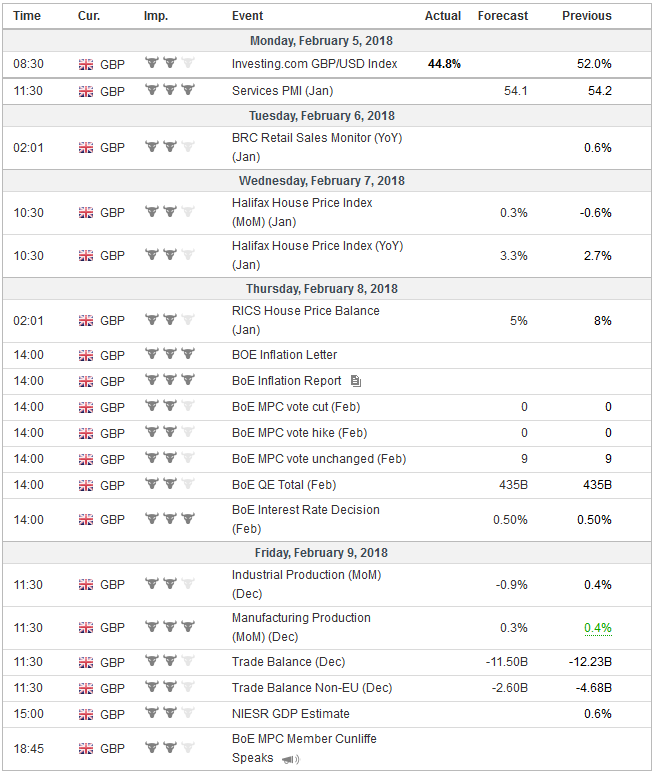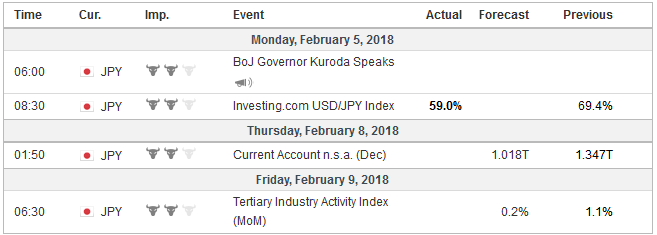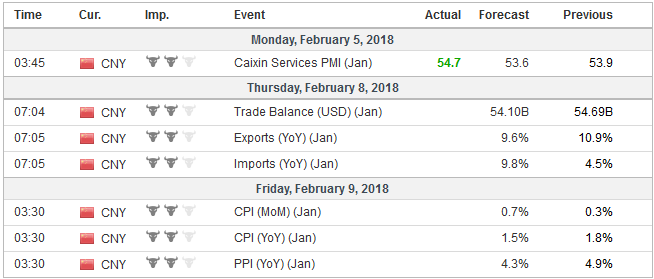The chief development in the capital markets has been the sharp drop in equities after a significant rally since late last year and the rise in yields. The dollar had fallen alongside the exuberant appetite for risk assets. Anecdotal evidence supports the idea that the greenback was used as a funding currency to purchase those risk assets. The Dollar Index’s first weekly advance since the middle of last December amid the sell-off in risk assets lends additional credence to the narrative. The drop in the S&P 500 has unwound about half of this year’s gains. The German, Swiss, and Canadian markets have given up even more, and are now down on the year. Of last week’s five sessions, the S&P 500 gapped lower twice and the
Topics:
Marc Chandler considers the following as important: China, equities, Featured, FX Trends, Interest rates, Japan, newsletter, U.K., USD
This could be interesting, too:
Nachrichten Ticker - www.finanzen.ch writes Die Performance der Kryptowährungen in KW 9: Das hat sich bei Bitcoin, Ether & Co. getan
Nachrichten Ticker - www.finanzen.ch writes Wer verbirgt sich hinter der Ethereum-Technologie?
Martin Hartmann writes Eine Analyse nach den Lehren von Milton Friedman
Marc Chandler writes March 2025 Monthly
The chief development in the capital markets has been the sharp drop in equities after a significant rally since late last year and the rise in yields. The dollar had fallen alongside the exuberant appetite for risk assets. Anecdotal evidence supports the idea that the greenback was used as a funding currency to purchase those risk assets. The Dollar Index’s first weekly advance since the middle of last December amid the sell-off in risk assets lends additional credence to the narrative.
The drop in the S&P 500 has unwound about half of this year’s gains. The German, Swiss, and Canadian markets have given up even more, and are now down on the year. Of last week’s five sessions, the S&P 500 gapped lower twice and the close on the session lows before the weekend warns of the strong downside momentum. Not only will Asian shares likely gap lower on Monday, but European bourses are likely to follow suit.
According to various valuation metrics, many equity markets were over-valued before last month’s rally. The one-week decline, as dramatic as it may have been, is of little substantive significance. The importance lies in the signal of a shift in risk appetites and an end to the recent market phase.
It is too early to conclude that the multi-year bull market is over. Discipline and prudence would advise that the initial operative assumption is that it is an arguably overdue correction. Many accounts of the stock market rise, whether attributed to speculation or earnings growth, do not seem to fully appreciate the role of low interest rates as a discounting mechanism, as a reduction in corporate debt servicing costs, and in terms of competing assets.
The rise in yields is the new fact. The US is ground zero. The FOMC statement left little doubt that the Federal Reserve will continue to raise interest rates, and the market is moving toward discounting a third rate hike this year. There has been increased speculation that the Powell Fed will be somewhat more aggressive than the Yellen Fed.
That said the rise in long-term US interest rates is not so much a function of Fed policy as it is fiscal policy. As we have noted, the supply of US bonds will rise sharply this year at the same moment that demand becomes less reliable. The US Treasury will more than double last year’s issuance, beginning with the quarterly refunding that kicks off in the week ahead. The borrowing needs are a function of the US debt and deficit, which the tax cuts will only exacerbate.
Meanwhile, the Federal Reserve will buy $420 bln fewer Treasuries than it did in 2017 and in 2019, it will reduce its purchases by another $600 bln. There is some risk that with the new corporate tax regime, corporations may have less incentive to park their offshore earnings in US debt instruments. At the same time, the appetite of foreign central banks for US Treasuries may be curtailed if the dollar stops falling.
A mitigating factor is that the ECB and Bank of Japan will be buying nearly all the issuance by their respective governments. Also, the US debt sales in recent weeks have been strongly received. In addition, the increase in yields may encourage some fund managers to re-weight fixed income over equities.
The break of the 30-year plus downtrend in long-term interest rates does not signal a return to the high yields seen in the late 1970s and early 1980s. By pre-crisis standards, the global economy, and in particular the high-income countries, is characterized by moderate growth and low inflation. Outside the UK, no G10 country is hitting its inflation target. That said market measures of inflation expectations are rising, though nominal rates appear to be rising faster (meaning that real rates are increasing).
The speed at which US Treasury Secretary Mnuchin and President Trump walked back any hint that the US was abandoning the more than two-decade strong dollar policy shows that even the Disrupter-in-Chief recognizes the significance of it. For its part, the BOJ stepped up its bond purchases and its defense of the Yield Curve Control policy. As we noted after Kuroda’s speech at Davos, there was no change in BOJ policy, not even marginally.
The majority of the ECB effectively pushed back against the hawks’ desire to give a date certain to end the asset purchases. In addition, the most likely scenario is that in Q4 18, the ECB tapers further rather than quit cold turkey its asset purchases in September.
United KingdomThe week ahead offers a light economic calendar. In addition, to the service PMIs and composite readings that are part of the monthly data cycle, three central banks hold policymaking meetings: The Bank of England, the Reserve Bank of Australia, and the Reserve Bank of New Zealand. No policy changes are warranted or expected. The BOE also issues its quarterly inflation report, which updates the central bank’s forecasts. BOE Governor Carney has sounded more optimistic lately and this is likely to be reflected in the new forecasts. We remain concerned that the uncertainty surrounding Brexit will take a toll on the UK economy. The past depreciation of sterling is having a diminishing impact on inflation. Sterling’s strength against the dollar in recent weeks is unlikely to have the economic impact of the depreciation because it remains broadly flat on a trade-weighted basis. On the other hand, there has been a significant improvement in the UK’s trade balance. In 2016, the UK recorded an average monthly trade deficit of GBP3.39 bln. In the first 11 months of 2017, the average had fallen to GBP2.38 bln. The December report is due out in the week ahead. That said, with the recent report of Q4 GDP, the December data (industrial output as well the trade figures) lose much of their interest for market participants. |
Economic Events: United Kingdom, Week February 05 |
JapanAs part of the monthly cycle of data, Japan and China report reserve figures. Japan’s reserves peaked in June 2012 near $1.31 trillion. They stood at $1.26 trillion at the end of last year. The decline is not material and valuation adjustments are likely the most important factor at work. |
Economic Events: Japan, Week February 05 |
ChinaChina’s reserves are a different story. A combination of valuation and capital outflows saw China’s reserves fall by around a trillion dollars over about two years, ending last January. Capital controls, an appreciating yuan, and have seen its reserves rise most of last year. They are expected to have risen by around $30 bln to $3.17 trillion in January. We argue that if China is going to rebuild its replenish its reserves, it has little choice than to add to its US Treasury holdings. Market participants may also be sensitive to China’s trade figures. Strong exports reflect robust global demand, while robust imports are understood to be supportive of emerging market economies. China also reports January inflation data, and both PPI and CPI are expected to soften. |
Economic Events: China, Week February 05 |
United StatesLastly, we note that despite US oil output (in November) surpassed Saudi Arabia output and will likely continue to do so as long as OPEC restraint continues. However, the idea that US shale production means that era of high oil prices is over may need to be reconsidered. Nevertheless, part of the rise in the price of oil appears to be driven by the dollar’s decline. A firmer dollar may coincide with a pullback in oil prices. |
Economic Events: United States, Week February 05 |
Switzerland |
Economic Events: Switzerland, Week February 05 |
Tags: #USD,China,equities,Featured,Interest rates,Japan,newsletter,U.K.





